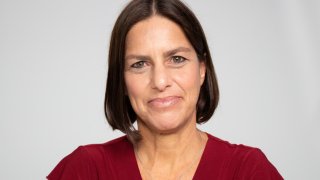
Geneticist Marlena Fejzo says she had bad morning sickness during her first pregnancy, but the symptoms she experienced during her second pregnancy in 1999 were much worse.
The only time Fejzo wasn't nauseous, she says, is when she laid "completely still and flat," and she wasn't able to hold down food or drinks.
Fejzo was eventually diagnosed with hyperemesis gravidarum (HG), but when she talked about her symptoms with her doctor, they didn't believe they were as bad as she described.
"My doctor told me that people [say] this," about their symptoms of HG, "usually, because they're trying to get attention from their mothers or family members," Fejzo tells CNBC Make It.
We're making it easier for you to find stories that matter with our new newsletter — The 4Front. Sign up here and get news that is important for you to your inbox.
Fejzo wasn't exaggerating in the slightest: "It was so bad that I could not eat or move without vomiting."
Hyperemesis gravidarum is a condition that causes severe vomiting during pregnancy, and it affects around 1% to 3% of pregnant women, according to the National Health Service. Notably, the U.K.'s Princess of Wales, the former Kate Middleton, struggled with the condition for all three of her pregnancies.
Fejzo says this percentage doesn't account for the people who haven't been diagnosed and believes the number is even higher.
Money Report
"I ended up on IV fluids and then my doctor tried seven different medications once and nothing helped me to be able to eat or drink anything," she says. "It really was like a form of torture. And eventually, I was put on a feeding tube, but it was too late. I lost the baby in the second trimester."
Throughout the harrowing process Fejzo kept advocating for herself, but didn't stop there. She went on to discover the gene that caused her severe morning sickness symptoms.
Now, Fejzo is set to open her first healthcare center, Harmonia Healthcare, to support women with obscure health conditions that are often overlooked and underdiagnosed, including her own condition, hyperemesis gravidarum (HG).
'Every single person in my study that had that mutation had hyperemesis'
Fueled by what she felt was a dismissal of her very real HG symptoms, Fejzo searched for a way to help other women living with the condition. She had a hunch that HG might be genetic and started her investigation there.
"I had to show that it ran in families to suggest there was a genetic component," she says. "I didn't have it in my family, so I wasn't sure."
It took two decades to find the answer.
"I did a familial aggregation study and found that there was a 17-fold increased risk of having it if your sister has it," she says.
Fejzo then partnered with genetics company, 23andMe, and "asked them to put hyperemesis in their survey, and they did and then we were able to do a genetic study."
With data from nearly 50,000 responses, Fejzo and her team discovered that "the greatest genetic risk factor" for HG was a variant of a gene called GDF15.
When Fejzo learned of the connection in 2020, she quit her job at UCLA where she was researching cancer, according to Time Magazine which named her one of their women of the year for 2024.
Within a few years, she played a key role in the research that ended in a big discovery about hyperemesis gravidarum: "It turned out that people with HG are genetically predisposed to have lower levels of GDF15 prior to pregnancy," Fejzo explains. "And so they are hypersensitive to the rise of this hormone during pregnancy."
"Every single person in my study that had that mutation had hyperemesis," she adds.
Now, her focus is finding ways to use this information to prevent women from experiencing the severe symptoms brought on by the condition.
"Maybe we can prevent HG by increasing those levels prior to pregnancy," Fejzo says. "And so Harmonia will be working on efforts to hopefully be able to predict and prevent HG."
Correction: This story has updated to correct the spelling of Marlena Fejzo's name. Fejzo's familial aggregation study found there was a 17-fold increased risk. A previous version misstated the number.
Want to make extra money outside of your day job? Sign up for CNBC's new online course How to Earn Passive Income Online to learn about common passive income streams, tips to get started and real-life success stories. Register today and save 50% with discount code EARLYBIRD.
Plus, sign up for CNBC Make It's newsletter to get tips and tricks for success at work, with money and in life.






